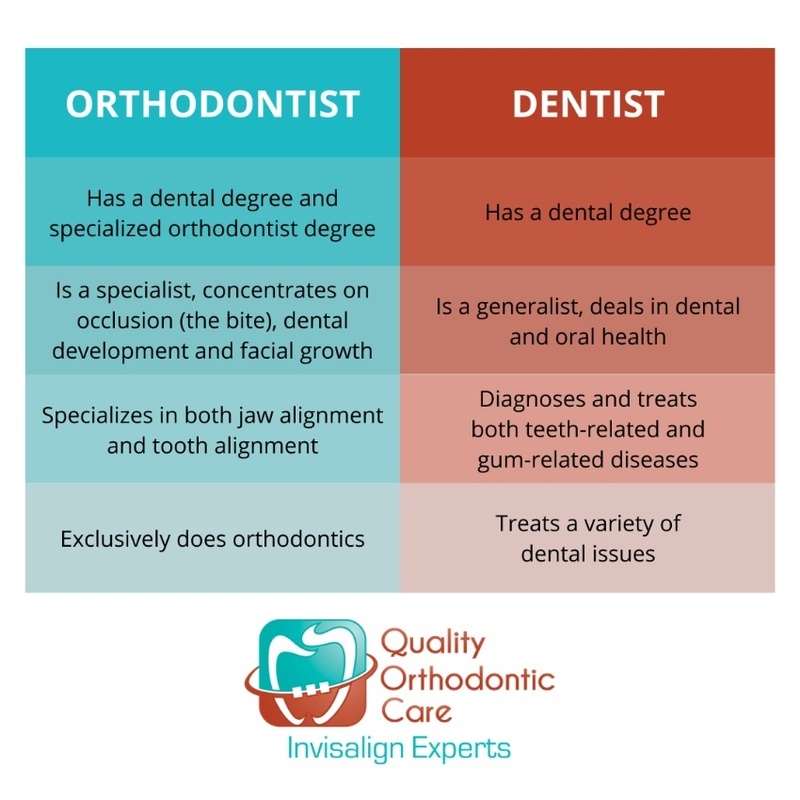What Does Causey Orthodontics Do?
What Does Causey Orthodontics Do?
Blog Article
The Buzz on Causey Orthodontics
Table of ContentsCausey Orthodontics for DummiesThe 6-Second Trick For Causey OrthodonticsCausey Orthodontics Fundamentals ExplainedAll about Causey OrthodonticsNot known Details About Causey Orthodontics The Best Strategy To Use For Causey OrthodonticsThe 9-Minute Rule for Causey Orthodontics
What is the distinction in between a dentist and an orthodontist? To respond to a question that is typically asked, both dental experts and orthodontists aid individuals acquire far better oral health, albeit in different ways. It assists to keep in mind that dental care is a rather wide science with various clinical field of expertises. All dental experts, including orthodontists, deal with the teeth, gums, jaw and nerves.
You can think of both medical professionals that deal with gum tissue and teeth problems. The main distinction is that ending up being an orthodontist needs a specific specialty in treating the misalignment of the teeth and jaw.
Little Known Questions About Causey Orthodontics.
An orthodontist is a dental expert that has actually gone through training to concentrate on the diagnosis, avoidance and treatment of irregularities in the jaw and teeth. Their training consists of dealing with these existing conditions. They can likewise recognize prospective problems in teeth positioning that might develop when conditions are left unattended. Orthodontists can assist people of all ages.
This consists of all the required education to become a basic dental expert. According to the American Trainee Dental Organization (ASDA), it indicates you will require to have either a Physician of Medication in Dental Care (DMD) or a Physician of Oral Surgical Treatment (DDS). Simply put, orthodontists need to complete dental school and after that get an orthodontics specialized education and learning.
Some orthodontists likewise obtain their masters in craniofacial biology. These programs concentrate on 2 specific areas or self-controls: Dentofacial Orthopedics: This research study concentrates on assisting teeth and jaw growth.
Causey Orthodontics - Truths

 The total goal of an orthodontist is to enhance a patient's bite. Not everybody is birthed with straight teeth, and an orthodontist will certainly make sure that clients get equally spaced straight teeth.
The total goal of an orthodontist is to enhance a patient's bite. Not everybody is birthed with straight teeth, and an orthodontist will certainly make sure that clients get equally spaced straight teeth.
6 Simple Techniques For Causey Orthodontics
The American Organization of Orthodontists advises your initial check up by age 7. You'll need to see your orthodontist if you have an imbalance in your teeth, also recognized as malocclusion. Additionally, if you observe irregular bite patterns, a slightly misshapen jaw, or when your teeth are overcrowded, you will likely need orthodontic treatment.
In enhancement, we offer adjustable therapy timetables, adaptable settlement choices and an enjoyable, enjoyable experience.
An orthodontist is a dental practitioner educated to diagnose, stop, and treat teeth and jaw irregularities. They fix existing conditions and are trained to recognize problems that may establish in the future. Orthodontists collaborate with people of every ages, from kids to adults. People frequently connect an excellent smile with health.
The Facts About Causey Orthodontics Revealed
Malocclusion, or misaligned teeth, can lead to oral issues, consisting of tooth decay, gum illness, and difficult or excruciating eating. Not every person is born with straight teeth. If you have a poor bite or big areas in between your teeth, you might desire to consult a dental expert concentrating on orthodontic care.
(Photo Credit History: DigitalVision/Getty Images) Orthodontists utilize repaired and detachable oral gadgets, like dental braces, retainers, and bands, to transform the position of teeth in your mouth. Orthodontic treatment is for dental irregularities, consisting of: Crooked teethBite issues, like an overbite or an underbiteCrowded teeth or teeth that are as well much apartJaw misalignmentThe goal of orthodontic treatment is to enhance your bite.
An Unbiased View of Causey Orthodontics

All orthodontists are dental professionals, but not all dental experts are orthodontists. Orthodontic residency programs offer intensive, concentrated instruction for oral experts. They concentrate on two locations: Just how to appropriately and safely relocate teeth Just how to properly lead development in the teeth, jaw, and faceOnce an orthodontist has completed training, they have the alternative to come to be board licensed.
Imbalance, or malocclusion, is one of the most usual reason people see an orthodontist. It is genetic and is the result of size differences in between the top and lower jaw or in between the jaw and teeth. cheapest orthodontist near me. Malocclusion leads to tooth overcrowding, an askew jaw, or uneven bite patterns. Malocclusion is generally treated with: Your orthodontist connects metal, ceramic, or plastic square bonds to your teeth.
All About Causey Orthodontics
If you have just minor malocclusion, you might be able to use clear braces, called aligners, as opposed to traditional braces. Some people need a headgear to aid move teeth into line with pressure from outside the mouth. After dental braces or aligners, you'll need to use a retainer. A retainer is a custom-made gadget that keeps your teeth in position.
Report this page